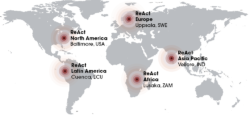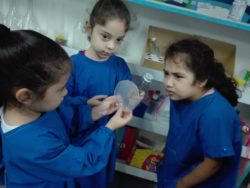In conversation with ReAct Group
As a network CE4AMR is always keen to hear from like-minded individuals and groups. This month we spoke to the team at ReAct to better understand their utilisation of community engagement with AMR interventions in Low and Middle income countries.
ReAct was initiated in 2005 and celebrated their 15 year anniversary this year! With increasing global attention to antibiotic resistance, ReAct is now aligning its work to respond to the next challenge: to ensure that the long-awaited response is corresponding to meet the actual needs, in particular in LMICs.
What is ReAct?
ReAct is a global network that works as a catalyst and thought leader to stimulate engagement globally on antibiotic resistance. We have a committed multidisciplinary team that works across sectors to identify and promote innovative and ecologically grounded solutions to manage antibiotic resistance. Our work is based on scientific evidence and experience rooted in country work. We believe in equitable access to effective prevention and treatment of bacterial infections as a core component of everyone’s right to health.
Where and with whom does ReAct work?
ReAct has nodes on five continents. We are based in Ecuador, India, Zambia, the US and Sweden. The ReAct network is wide and we work together with civil society organizations, governmental authorities, UN organ s, health care associations, universities and local organizations to drive action.
s, health care associations, universities and local organizations to drive action.
ReAct collaborates across sectors at a local, national and global context addressing antibiotic resistance from the grass root level to global level.
How can you get involved with the ReAct network?
An easy way is to follow us on Twitter, Facebook and LinkedIn, subscribe to our newsletter or visit our website.
Why is community engagement particularly important in addressing antibiotic resistance?
Without effective civil society mobilization and participation, any response, whether robust or weak, will risk not taking into account the particular challenges that local communities face.
Antibiotic resistance is an issue with multi-sectoral drivers and a number of these drivers can be directly influenced by changing the behavior in communities and of the general public. This can range from reducing over-the-counter use of antibiotics to improved community hygiene practices which can reduce infections to promotion of food products made without routine use of antibiotics. There are several layers to a sustained change in behavior; and it can involve understanding and altering the socio-cultural milieu of the target population.
It is essential to have a robust understanding of the cultural narratives around health and disease in the target community. This can only be achieved through an in-depth engagement with the community, through a process which can create trust. The issue of antibiotic resistance cannot be dealt alone in the context of a community, rather we have to address it as a part of a much broader spectrum which involves issues in health and development domains.
How does ReAct facilitate the use of community engagement methods to address antibiotic resistance?
The three regional nodes of ReAct- working in Africa, Asia-Pacific and Latin America- has been using various strategies for community engagement. The overall aim of all the community engagement initiatives have been to design models for community based action on antibiotic resistance, which can possibly be scaled up in other similar socio-cultural contexts.
- ReAct Africa
 has been working with students, farmers and county governments to understand their perceptions on the issue and formulate activities to increase their competence to take action on antibiotic resistance. Image shows the ReAct Africa Conference 2019, themed around antimicrobial resistance and the link to Universal Health Coverage and Sustainable Development Goals. The conference attracted 120 multi-sector participants from 33 different countries and has been an annual event since 2016.
has been working with students, farmers and county governments to understand their perceptions on the issue and formulate activities to increase their competence to take action on antibiotic resistance. Image shows the ReAct Africa Conference 2019, themed around antimicrobial resistance and the link to Universal Health Coverage and Sustainable Development Goals. The conference attracted 120 multi-sector participants from 33 different countries and has been an annual event since 2016. - ReAct Asia Pacific
 has been working with local self-government institutions in India, farmers groups and students to achieve similar goals. The ASPIC club initiative seeded by ReAct Asia Pacific has grown to be one of the largest university-based student networks working on antibiotic resistance. The image here shows a New ASPIC Club inaugurated at the historic Saint Berchmans College in India during World Antibiotic Awareness week in 2019.
has been working with local self-government institutions in India, farmers groups and students to achieve similar goals. The ASPIC club initiative seeded by ReAct Asia Pacific has grown to be one of the largest university-based student networks working on antibiotic resistance. The image here shows a New ASPIC Club inaugurated at the historic Saint Berchmans College in India during World Antibiotic Awareness week in 2019. - The antibiotic-smart communities project of ReAct Asia Pacific is an ambitious exercise to define the contours of what constitutes ‘antibiotic smartness’ in a community and the methodologies which can be employed to achieve it.
- ReAct Latin America has been a pioneer in using large social movements to increase people's understanding of appropriate use of medicines and holistic health concepts. Working close to their community.
- The Alforja Educativa project of ReAct Latin America has been successful in engaging school s
 tudents on the issue of antibiotic resistance and increasing their overall awareness about the human body, health, disease and our intricate balance with nature. This approach is being piloted in Africa too and certain aspects of the same are being used for school-level activities in the Asia Pacific region.
tudents on the issue of antibiotic resistance and increasing their overall awareness about the human body, health, disease and our intricate balance with nature. This approach is being piloted in Africa too and certain aspects of the same are being used for school-level activities in the Asia Pacific region.
The end-point of the community engagement initiatives of ReAct is to generate knowledge about the right strategies and document the processes. It is important that we build the collective knowledge base on methods to engage communities on a seemingly technical topic like antimicrobial resistance. This can be invaluable at the time of operationalizing the National Action Plans on Antimicrobial Resistance at the grass-roots levels.
What does ReAct think is the biggest challenge in addressing antibiotic resistance?
Antibiotic resistance can be likened with a slow, growing, silent and faceless pandemic. This makes it challenging to raise the profile of antibiotic resistance high enough on the political agenda to get the adequate response and financing that it really requires.
The National Action Plan on Antimicrobial Resistance is the most important document which guides country level activities to tackle the problem. Though most of the countries have launched their National Action Plans, a major issue is that many countries have not operationalized these plans due to paucity of finances, inadequate governance structures and lack of ownership.
Antibiotic resistance is a global system failure and we all have overused antibiotics for more than 50 years. To protect this precious resource that antibiotics are - we need to understand that action needs to be taken now, while we still can preserve the effectiveness of these life-saving medicines. To achieve this we need a strong community-wide response, with action coordinated under the leadership of national governments, and with global cooperation.
ReAct also interviewed Jess on behalf of CE4AMR, you can access the article here. If you would like to be featured on the CE4AMR website please get in touch with Jess (j.mitchell1@leeds.ac.uk)
